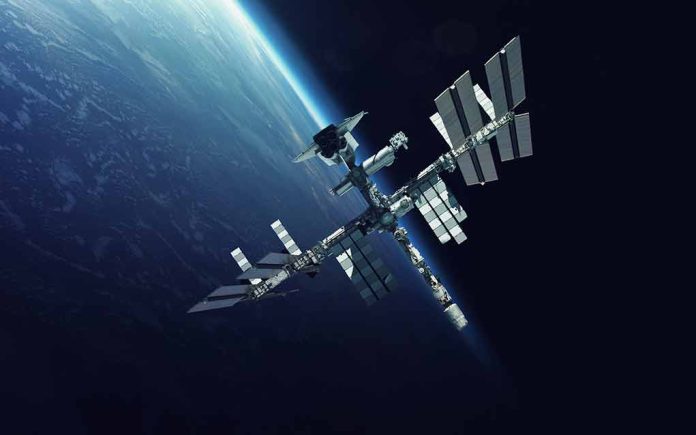
Russia’s ambitious space station launch sparks both excitement and concern as the world watches closely, wondering if this scientific endeavor could potentially escalate global tensions.
At a Glance
- Russia plans to launch its own space station, claiming purely scientific purposes
- Global observers are divided between enthusiasm for scientific progress and worry over potential militarization
- The launch carries significant implications for international space treaties and global security dynamics
- Russia faces challenges due to sanctions and reduced international cooperation in space
Russia’s Space Ambitions: A Double-Edged Sword
As Russia prepares to launch its own space station, the international community finds itself at a crossroads. While the prospect of scientific advancement is enticing, concerns about potential space militarization loom large. For patriotic Americans over 40, this development raises questions about national security and the future of space exploration.
Russia’s space program has faced significant challenges in recent years. Since 2014, the Russian space sector has grappled with institutional restructuring and external economic pressures. The annexation of Crimea triggered waves of sanctions that crippled the country’s access to space technologies and international cooperation.
The Militarization Concern
While Russia asserts that its space station is dedicated entirely to scientific and peaceful purposes, the international community remains skeptical. The country’s development of space weapons, including jamming, spoofing, directed-energy systems, and kinetic projectiles, has raised alarms. Even more concerning is the alleged development of a nuclear anti-satellite weapon capable of disabling hundreds of satellites.
NEW: Sources saying this national security threat has to do with Russia and space.
Story TK.
— Erin Banco (@ErinBanco) February 14, 2024
These developments have led to increased tensions between Russia and the West, particularly the United States. The U.S. and Japan recently introduced a UN Security Council resolution reaffirming the Outer Space Treaty’s ban on nuclear weapons in space, which Russia vetoed. This move has only heightened suspicions about Russia’s true intentions in space.
Navigating Complex Diplomatic Waters
The situation presents a complex diplomatic challenge. While the United States has limited economic leverage over Russia due to its isolation from the West, countries like China and India have increased trade ties with Russia. These nations could potentially play a crucial role in pressuring Russia to abandon the pursuit of indiscriminate space weapons.
The United States faces the delicate task of balancing its own space interests with the need to prevent further militarization of space. This may involve offering trade incentives to China and India in exchange for their cooperation in pressuring Russia. However, such moves could be politically challenging and may face opposition from those concerned about national security.
The Path Forward
As Russia moves forward with its space station launch, the international community must remain vigilant. While scientific cooperation in space has historically been a bridge between nations, the current geopolitical climate presents new challenges. For American patriots, the situation calls for a careful balance between supporting scientific progress and safeguarding national interests.
The coming months and years will be crucial in determining whether Russia’s space station becomes a beacon of scientific achievement or a source of increased global tension. As we watch this story unfold, it’s clear that the final frontier remains a complex battleground of diplomacy, science, and national interests.





